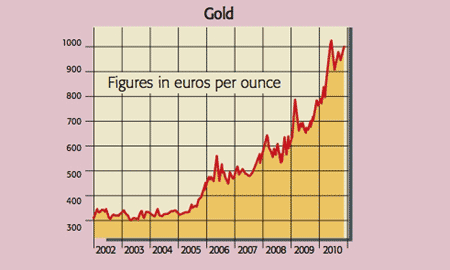Get the latest financial news, insights and expert analysis from our award-winning MoneyWeek team, to help you understand what really matters when it comes to your finances.
You are now subscribed
Your newsletter sign-up was successful
Want to add more newsletters?

Twice daily
MoneyWeek
Get the latest financial news, insights and expert analysis from our award-winning MoneyWeek team, to help you understand what really matters when it comes to your finances.

Four times a week
Look After My Bills
Sign up to our free money-saving newsletter, filled with the latest news and expert advice to help you find the best tips and deals for managing your bills. Start saving today!
Markets rose for much of the autumn as they got ready for another dose of liquidity from the US Federal Reserve. But now the trend is changing as "the mood has darkened considerably", said Lena Komileva of Tullett Prebon. Already rattled by the prospect of China clamping down on inflation and Europe's sovereign debt crisis, markets were hit by another outbreak of hostilities on the Korean peninsula this week. North Korea shelled a South Korean island, targeting both the military and civilians; Russia said it saw a "colossal danger" of the situation escalating.
Markets slid, with the Hang Seng index losing 2.7% on Tuesday alone. The FTSE 100 has hit a seven-week low. The CRB index of commodities is near its lowest level in a month and gold has recovered from its recent correction. It is close to its record highs of $1,400.
What the commentators said
When it comes to Europe, "one gets this terrible feeling of dj vu", said Buttonwood on Economist.com. In 2008, rescue plan followed rescue plan and the consequent rallies "got shorter and shorter".
MoneyWeek
Subscribe to MoneyWeek today and get your first six magazine issues absolutely FREE

Sign up to Money Morning
Don't miss the latest investment and personal finances news, market analysis, plus money-saving tips with our free twice-daily newsletter
Don't miss the latest investment and personal finances news, market analysis, plus money-saving tips with our free twice-daily newsletter
Relief over support for Ireland proved extremely short-lived this week. Government debt yields kept climbing, with Spain's ten-year yield reaching a record spread over German bunds. Now along comes the "roguest of rogue states", North Korea, whose next move is always utterly unpredictable, said Allister Heath in City AM. This uncertainty, and the possibility of a war that could devastate the region, is sending "shivers down everyone's spine".

The latest news from China has also prompted a stark shift in investor sentiment from "maximum bullish" to "extremely wary", said JP Morgan's Jing Ulrich. Inflation is at a "worrying" 4.4%, said Lex in the FT. Food inflation's rise to 10% is especially worrying as much of the population "still lives close to the edge". Last week, China raised bank reserve requirements, limiting how much they can lend, for the fifth time this year. It will also trim the overall amount of bank lending next year. But "it could be more aggressive the credit brakes are being tapped, not slammed".
China's tightrope walk between cooling the overheating economy and keeping growth high enough to prevent social unrest could end in "a messy crash", said Lex. Note too, added Dylan Grice of Socit Gnrale, that every financial crisis since the 1870s has been preceded by rampant credit growth. In the meantime, investors have to gauge the impact of a slowing China on its domestic asset markets and global commodities markets, said Ian Campbell on Breakingviews.com. Markets look set to struggle from here as rattled investors book profits before the end of the year.
Get the latest financial news, insights and expert analysis from our award-winning MoneyWeek team, to help you understand what really matters when it comes to your finances.
MoneyWeek is written by a team of experienced and award-winning journalists, plus expert columnists. As well as daily digital news and features, MoneyWeek also publishes a weekly magazine, covering investing and personal finance. From share tips, pensions, gold to practical investment tips - we provide a round-up to help you make money and keep it.
-
 How a ‘great view’ from your home can boost its value by 35%
How a ‘great view’ from your home can boost its value by 35%A house that comes with a picturesque backdrop could add tens of thousands of pounds to its asking price – but how does each region compare?
-
 What is a care fees annuity and how much does it cost?
What is a care fees annuity and how much does it cost?How we will be cared for in our later years – and how much we are willing to pay for it – are conversations best had as early as possible. One option to cover the cost is a care fees annuity. We look at the pros and cons.

